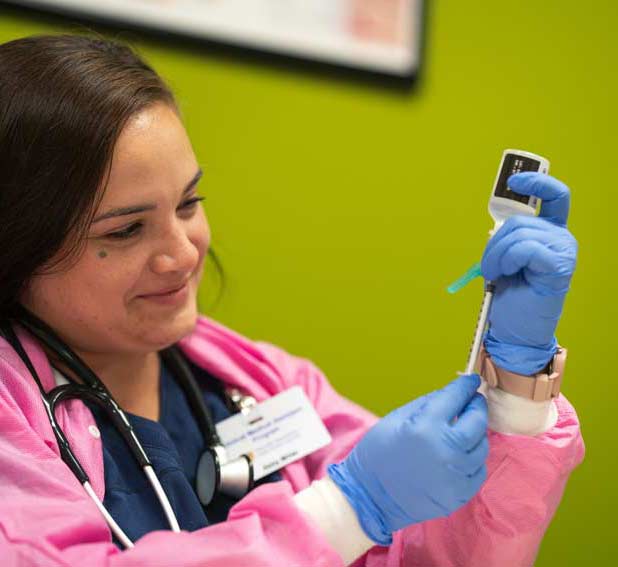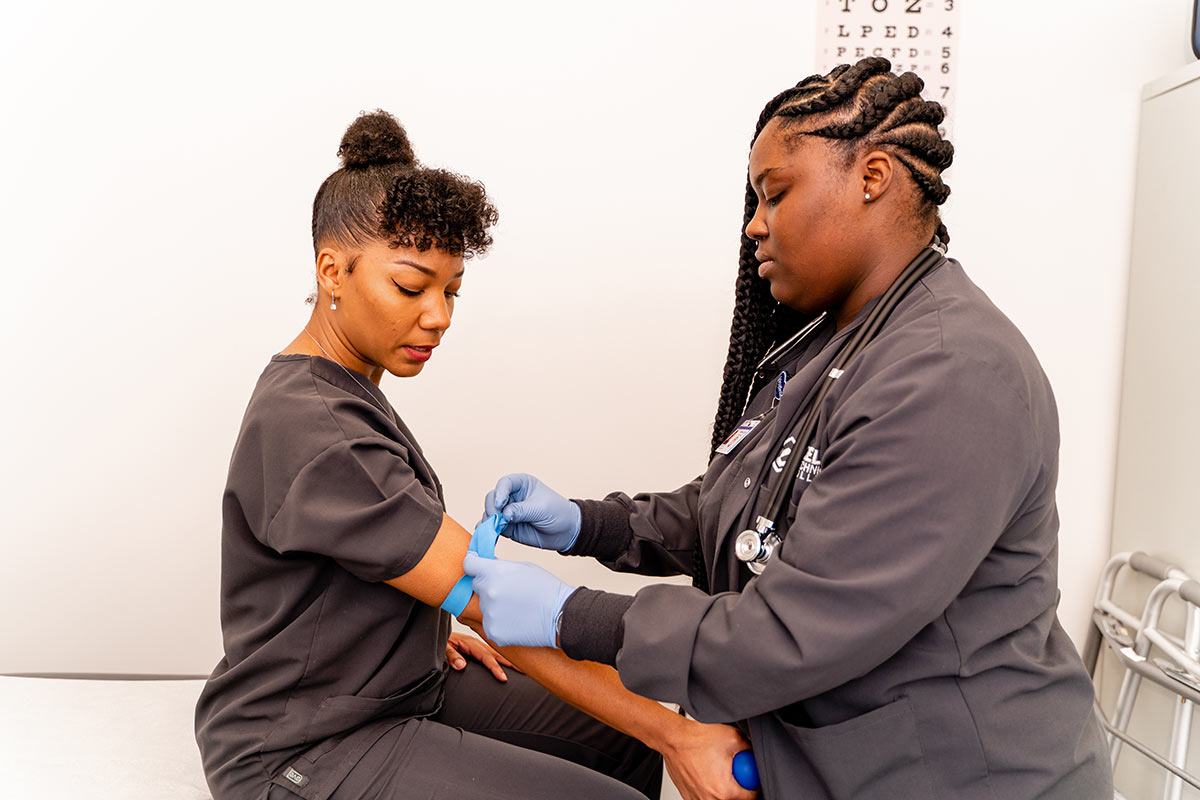Phlebotomy Classes Near Me: Flexible Options That Fit Your Schedule
Phlebotomy Classes Near Me: Flexible Options That Fit Your Schedule
Blog Article
The Course to Qualification: Recognizing the Phlebotomy Educating Course Trip and Its Importance
As you think about the course to qualification in phlebotomy, it's vital to understand the duty you'll play in healthcare. Your training will cover important abilities, from blood collection strategies to patient communication.

The Role of Phlebotomists in Health Care
Phlebotomists play a crucial role in the health care system, serving as the essential link between clients and important analysis screening. You'll execute blood draws, making certain samples are collected properly and safely. Your know-how helps in identifying medical conditions, monitoring health and wellness, and leading therapy decisions.
In your everyday interactions, you'll require to establish trust fund with individuals, making them really feel comfortable during what could be a stressful experience. You're accountable for labeling and handling samples thoroughly to avoid contamination or mistakes, which can impact test outcomes.
Yet, you'll usually work together with medical professionals and nurses, communicating crucial info about patients' conditions. Your role is fundamental in preserving the process in health care settings, making certain prompt and exact outcomes. By mastering your skills, you add meaningfully to patient care, making you an important component of the medical group. Accepting this responsibility is key to your success as a phlebotomist.
Introduction of Phlebotomy Training Programs
When checking out phlebotomy training programs, you'll locate different types made to fit different routines and discovering designs. Each program helps you create important skills like blood collection and client communication. Understanding these options is essential to selecting the ideal course for your profession.
Kinds of Educating Programs
Numerous kinds of training programs are readily available for those seeking to become skilled in phlebotomy. You can pick from certification programs, which normally last a couple of months and concentrate on essential abilities. There are additionally diploma programs that offer an even more extensive education and learning, commonly lasting approximately a year. If you're trying to find a much deeper understanding, an associate level in a relevant field could be the ideal fit. On-line training courses supply versatility for those stabilizing job or household dedications, permitting you to study at your own pace. Furthermore, some health centers and centers offer on-the-job training programs, offering useful experience while you learn. Whatever path you pick, each program intends to equip you with the necessary abilities for a successful phlebotomy profession.

Key Skills Established
Mastering phlebotomy requires a set of crucial abilities that are developed via complete training programs. Additionally, communication abilities are basic; you'll require to engage with patients, describe procedures, and put them at convenience. Each of these skills is crucial for your success as a qualified phlebotomist, making you a useful property in any kind of health care setup.
Secret Parts of a Phlebotomy Course
In a phlebotomy course, you'll concentrate on essential topics that lay the foundation for your future occupation. You'll engage in hands-on training that permits you to use what you've discovered in real-world settings. Both the core curriculum and useful experience are crucial for your success as a phlebotomist.
Core Curriculum Introduction
While seeking a phlebotomy training program, you'll encounter a core curriculum designed to furnish you with essential skills and understanding. Phlebotomy Training Course. This curriculum normally consists of composition and physiology, concentrating on the blood circulation system and comprehending blood elements. You'll additionally learn around various types of blood collection techniques, including venipuncture and capillary puncture techniques
Additionally, infection control and security protocols are crucial parts, ensuring you understand how to preserve a clean and sterile setting. You'll study patient interaction, highlighting interaction and empathy, which are important for relieving patient anxiousness. Ultimately, moral and lawful considerations will certainly be resolved, preparing you for real-world duties. This foundational knowledge will allow you to stand out as a phlebotomist and provide quality treatment in professional setups.
Hands-On Training Experience
Getting hands-on experience is an essential component of your phlebotomy training course. This useful training permits you to i thought about this apply what you have actually discovered in a real-world setup, enhancing your abilities and confidence. You'll practice venipuncture techniques, discover exactly how to take care of different kinds of samplings, and obtain acquainted with the devices made use of in the area. Under the support of knowledgeable instructors, you'll improve your abilities, ensuring you're prepared for any type of situation you could face.
In addition, you'll get the chance to connect with patients, which is vital for developing your communication abilities. This combination of technical efficiency and interpersonal abilities is important for your success as a certified phlebotomist. Inevitably, hands-on training is where theory satisfies technique, strengthening your understanding and preparedness for certification.
Qualification and Licensing Requirements
Prior to you can begin your occupation in phlebotomy, it is important to understand the accreditation and licensing demands that vary by state. The majority of states need phlebotomists to hold an accreditation from an identified company, such as the National Phlebotomy Organization or the American Culture for Professional Pathology. These certifications generally include passing an examination that evaluates your knowledge and abilities in the area.
Along with certification, some states have particular licensing demands. You may require to finish a specific number of hours in clinical method, send proof of training, or undertake a history check. It is crucial to investigate your state's laws to make certain you meet all needed criteria.
Staying informed regarding these requirements not only helps you safeguard a position yet additionally improves your reputation as a specialist. By satisfying these needs, you'll be well on your method to a successful occupation in phlebotomy.
Hands-On Training and Practical Experience
Hands-on training and practical experience are vital parts of your phlebotomy education and learning, as they permit you to use academic understanding in real-world circumstances. During your training, you'll participate in monitored venipuncture, find out correct strategies, and come to be acquainted with different blood collection tools. This direct participation is crucial for developing your self-confidence and developing your abilities.
You'll work very closely with experienced experts that can guide you with the subtleties of person interaction and example handling. Each practice not just strengthens your understanding yet also prepares you for the hectic atmosphere of healthcare setups.
Additionally, several programs incorporate scientific turnings, permitting you to experience varied settings, from hospitals to outpatient centers. This exposure helps you adjust to different obstacles and client needs, ensuring you're well-prepared for your future function. Embrace these opportunities, as they're vital to becoming a competent and caring phlebotomist.
Difficulties Faced During Training
While obtaining hands-on experience is important, it's crucial to acknowledge the difficulties that can arise during your phlebotomy training. You might run into anxiety when performing treatments on actual patients, specifically if you're brand-new to the setting. have a peek here The stress to obtain every little thing right can be frustrating. In addition, mastering the abilities required for blood attracts takes technique; you might have problem with strategy initially.
Time administration can likewise be a hurdle, as balancing theory, useful sessions, and individual dedications can really feel challenging. You may deal with differing finding out speeds amongst your peers, leading to feelings of self-doubt if you believe you're falling back. Ultimately, adjusting to the various individualities of teachers can be tough, as each may have a distinct mentor style.
Acknowledging these challenges at an early stage can prepare you for success and help you create strength throughout your training journey.
Job Opportunities After Accreditation

As you acquire experience, you could also take into consideration concentrating on areas like pediatric or senior citizen phlebotomy, dealing with specific individual needs. Some phlebotomists select to progress their careers by ending up being research laboratory service technicians or seeking further education in medical care areas.
Additionally, your qualification can lead to roles in training or overseeing new phlebotomists, enabling you to share your expertise. With the healthcare market consistently growing, your skills will always remain in need, leading the way for a stable and satisfying job. Accept the opportunities waiting on you!
Often Asked Inquiries
What Is the Typical Duration of a Phlebotomy Educating Training Course?
Phlebotomy training courses generally last around 4 to 8 weeks. You'll participate in hands-on technique, class guideline, and on-line understanding. Finishing this training prepares you for certification and a gratifying profession in health care.
Are Online Phlebotomy Courses Available?
Yes, on the internet phlebotomy training courses are readily available. They offer flexibility and wikipedia reference convenience, allowing you to study at your very own rate. Simply validate the program is approved to fulfill accreditation demands and acquire beneficial abilities for your job.
Just How Much Does Phlebotomy Training Commonly Price?
Phlebotomy training normally costs between $700 and $2,500, relying on the program and area. You must think about factors like course length, consisted of products, and hands-on experience when selecting the best training for you.
What Prevail Requirements for Phlebotomy Training?
Common requirements for phlebotomy training typically include a secondary school diploma or GED, immunizations, and a history check. Some programs may likewise need standard health care knowledge or accreditations, guaranteeing you're gotten ready for hands-on training.
Can I Function While Completing My Phlebotomy Training?
Yes, you can function while completing your phlebotomy training. Lots of students equilibrium tasks with their researches, but ensure to manage your time successfully to assure you meet both job and training dedications successfully.
Report this page